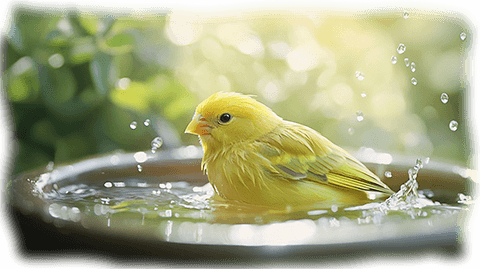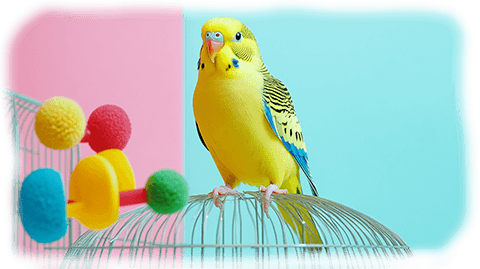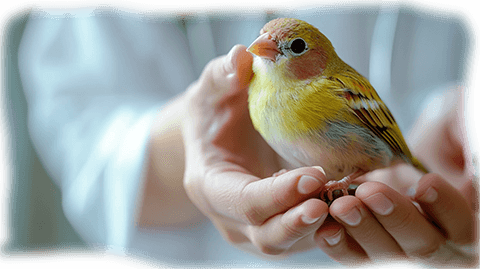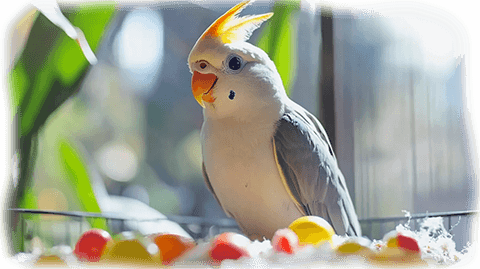Lovebird Health: Comprehensive Care Guide
Lovebirds are small, vibrant parrots known for their lively personalities and strong pair bonds. While they are generally hardy, lovebirds require attentive care to ensure they stay healthy and live long, happy lives. Understanding their specific health needs, recognizing common health issues, and knowing how to provide preventive care are crucial for keeping your lovebird in top condition.
Common Health Issues in Lovebirds
Lovebirds can suffer from a range of health issues, some of which are common to all parrots, while others are more specific to their species. Below are the most common health problems in lovebirds and how to address them.
1. Respiratory Issues
Lovebirds are prone to respiratory infections, which can be caused by cold drafts, dusty environments, or fungal infections like aspergillosis.
- Symptoms – Wheezing, nasal discharge, coughing, tail bobbing (difficulty breathing), lethargy.
- Prevention – Keep their environment free from drafts, provide fresh air circulation (Amazon affiliate link), and avoid exposing them to smoke, aerosols, or strong fumes.
- Treatment – Seek veterinary care immediately. Respiratory infections can escalate quickly and may require antibiotics or antifungal treatments.
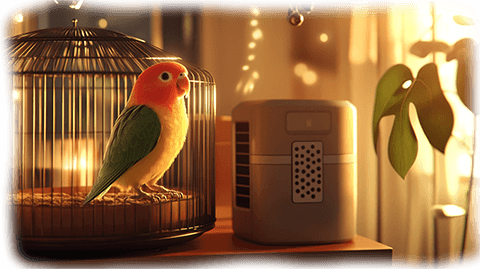
2. Psittacosis (Parrot Fever)
Psittacosis is a bacterial infection that affects parrots and can also spread to humans (zoonotic). Lovebirds are particularly susceptible.
- Symptoms – Lethargy, greenish diarrhea, discharge from the eyes or beak, and weight loss.
- Prevention – Keep cages clean, avoid contact with wild birds, and have regular vet checkups. Psittacosis can be prevented with proper hygiene.
- Treatment – Antibiotics prescribed by a vet. It’s crucial to treat both the bird and clean their environment thoroughly.
3. Feather Plucking
Lovebirds may pluck their feathers due to stress, boredom, or underlying health problems.
- Symptoms – Bald patches, irritated skin, continuous pulling of feathers.
- Prevention – Provide mental stimulation through toys, ensure social interaction (especially if housed alone), and give a balanced diet rich in vitamins.
- Treatment – First, rule out medical issues with a vet. If the cause is behavioral, increase mental enrichment and consider more frequent socialization.
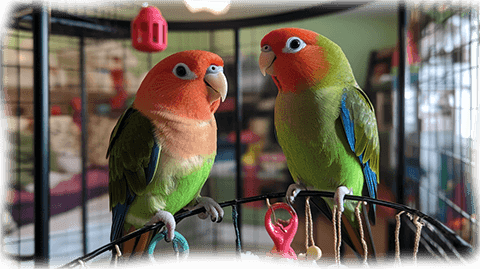
4. Beak and Feather Disease
This viral disease affects a bird’s beak, feathers, and immune system, and can be fatal in lovebirds.
- Symptoms – Feather loss, beak deformities, and lethargy.
- Prevention – No known cure, but quarantining new birds before introducing them to your lovebird can help prevent transmission.
- Treatment – No cure is available, so prevention and supportive care are key. Consult an avian vet for management options.
5. Nutritional Deficiencies
A poor diet is one of the most common causes of health problems in lovebirds. Seed-based diets are not sufficient on their own and can lead to vitamin and mineral deficiencies.
- Symptoms – Weakness, poor feather condition, lethargy, and susceptibility to infections.
- Prevention – Provide a balanced diet consisting of high-quality pellets, fresh fruits, and vegetables (Amazon affiliate link). Avoid relying solely on seeds, as they are deficient in essential nutrients. (Amazon affiliate link)
- Treatment – If you suspect nutritional deficiencies, consult an avian vet for a recommended diet plan. Supplements may also be suggested. (Amazon affiliate link)
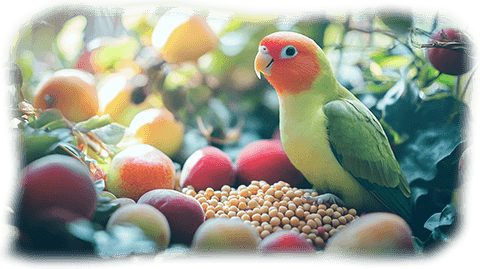
6. Egg Binding
Female lovebirds, particularly those without mates, can suffer from egg binding, where they are unable to pass an egg. This is a life-threatening condition.
- Symptoms – Lethargy, swelling in the abdomen, straining to pass an egg, sitting at the bottom of the cage.
- Prevention – Ensure your lovebird has enough calcium in their diet to support reproductive health, and provide a safe, stress-free environment.
- Treatment – Immediate veterinary care is needed. Treatments may include calcium supplementation, fluid therapy, or in severe cases, surgery.
Preventive Health Care for Lovebirds
Preventing health issues is always better than treating them after they occur. Here are some crucial preventive care tips to keep your lovebird healthy:
- Balanced Diet – Offer a mix of high-quality pellets, fresh fruits (like apples and berries), vegetables (such as leafy greens), and grains. Seeds can be given in moderation.
- Clean Environment – Keep their cage clean (Amazon affiliate link) and dry. Replace bedding regularly and disinfect the cage, perches, and food/water dishes weekly to prevent bacterial growth.
- Socialization and Mental Stimulation – Lovebirds are social creatures. They need interaction, whether it’s with another lovebird, their owner, or toys to keep them mentally stimulated.
- Regular Exercise – Let your lovebird fly in a safe, supervised area daily. This helps maintain muscle tone and overall health.
- Vet Checkups – Schedule regular checkups with an avian vet. Early detection of potential health problems is essential for keeping your lovebird healthy.
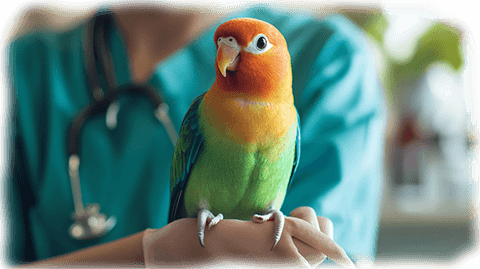
Signs Your Lovebird May Be Sick
Recognizing early signs of illness is critical for lovebird health, as birds often hide symptoms until they are very sick. Here’s what to watch for:
- Lethargy or unusual quietness
- Loss of appetite or sudden weight loss
- Changes in droppings (color or consistency)
- Fluffed-up feathers for extended periods
- Difficulty breathing or tail bobbing
- Excessive sleeping or hiding
- Discharge from the eyes, beak, or nostrils
If you notice any of these symptoms, consult an avian vet immediately. Lovebirds can decline quickly, and early treatment is vital for recovery.
Lovebird Lifespan and Health Care Tips
With proper care, lovebirds can live between 10 to 15 years. Providing them with a stimulating environment, balanced nutrition, and regular vet visits will ensure they thrive throughout their lifespan. Here are a few additional tips:
- Calcium Supplements – Female lovebirds, especially if laying eggs, may need calcium supplements to prevent egg binding.
- Bathe Regularly – Offer your lovebird opportunities to bathe by misting them or providing a shallow dish of water. This helps keep their feathers clean and reduces the risk of skin infections.
- Avoid Teflon – Non-stick cookware coated with Teflon can release fumes toxic to birds. Avoid using these products in a household with birds.
Further reading: “Lovebirds. Lovebirds as pets. Lovebird Keeping, Pros and Cons, Care, Housing, Diet and Health” (Amazon affiliate link) by Roger Rodendale.
Affiliate Disclosure
This post may contain affiliate links, which means I earn from purchases made through links. Please see the privacy policy page for more details.

